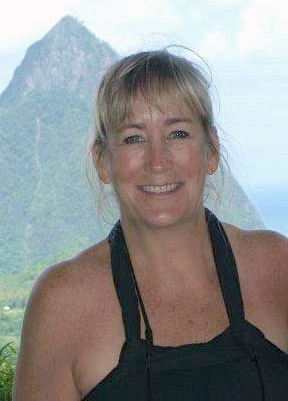Allison Heater, Shipboard Scientific Services Group technician
 Allison Heater
Allison HeaterTell me a little about how you wound up working at sea.
It’s kind of a long story. My undergrad degree is in mechanical engineering. I had a job that I was kind of unhappy with, and I ended up joining the Peace Corps. I was in Africa, in Botswana, which is a dry, sandy, landlocked country—a lot of beach and no ocean. I really missed water. When I finished the Peace Corps and was coming back, I thought it was a good time to go to grad school and did my master’s in ocean engineering. It’s sort of a cross between civil engineering and oceanography. When I finished, I took a job on a seismic ship for an oil company. They were surveying the bottom in the Gulf of Mexico, looking for oil and natural gas. That’s how I started out working on ships.
Did you grow up around the ocean?
No, not near the ocean, but I did grow up around water. I’m from Minnesota, the land of lakes, but I’ve always been sort of an ocean person, even just from my exposure on vacations.
Did you know you wanted to work on a ship?
Not really. I knew I wanted to be near water. Basically, when I got out of school, I didn’t know where I wanted to live or exactly what I wanted to do. I had a lot of friends who were doing the seismic job, and it sounded cool, so I gave it a try. It was six weeks on the ship, six weeks off, which was really nice schedule since it wasn’t too long at sea, and you got a lot of time to yourself afterward. Once you start sailing, it sort of sticks with you, I think.
How would you describe your job on Atlantis?
It varies a lot from trip to trip. I make sure all the Internet-related stuff is up and running. That means our ship’s internal network, the scientific network, all the Internet equipment, and the radome, which looks like a big white ball on the back of the ship. Inside that is a big dish-shaped antenna that connects us to the Internet via satellite. It’s slow, but when you think about it, it’s amazing that we can get onto the Internet out here in the middle of the ocean! Other than that, we also work with a lot of scientific instruments here on the ship, like deploying and recovering CTDs [instruments that measure conductivity, temperature, and depth of the water], bottom-mapping systems, instruments that measure currents, and more. Generally, SSSGs are involved in troubleshooting all of those, as well as collecting and managing the data that comes from them. When Alvin is being used, we also work with their team to download and process all of the data from the sub.
What do you like most about the job?
The job itself is really quite cool. You get to meet a lot of different scientists in a lot of different fields and learn about what they do. Unlike a lot of the rest of the crew, if there’s a science meeting or presentation, we’re there as participants, so we learn a lot about the research happening on the ship as part of our job. It’s really rewarding to feel like I’m part of the science community.
You’re supporting so many different technical aspects of the ship—it must get pretty stressful sometimes.
Yes, but it’s mostly just stressful at the start of a cruise, when a lot of new scientists are on board, and you have to prioritize all their needs. Everybody thinks their request is the most important. You can’t blame them. They spent years trying to put their cruise together, and they want to make sure it all goes smoothly, so they’re really stressed out. To be good at this job, you have to be kind of diplomatic, so I spend a lot of time trying to figure out where people are coming from and helping them understand what we can and can’t do. I try to accommodate everyone as best as I can, though.
Any good diplomatic lessons?
Yes: Smile a lot.
What do you do to unwind after a tough day?
Sleep, mostly! I do a fair amount of reading and mostly just hide out in my room. Occasionally I’ll watch a movie in the lounge or go sit outside, but I do a lot of hiding.
Is that hard to do on a ship?
That’s the thing—my cabin is the only real place I can completely do that, but this ship is not nearly as bad as some smaller ones I’ve worked on. There, you’d be sitting watching a movie once your shift is over, and someone would walk past and immediately want your help with something. It’s a little harder to set up those sorts of boundaries on smaller ships.
Is there anything you’d want people to know about your job who might want to start out in the field?
I think they should know that there are bathrooms on the ship! I was on a plane after one of my six-week rotations in the Gulf, and a woman next to me asked me about what I was doing out there. When I told her, her eyes got really wide, and she asked me, “Are there bathrooms out there?” I just started laughing.
Seriously, though, I guess what I would say is that if you’re adventurous, don’t let yourself get stuck in what the normal expectations of a job are. Not every job is a nine-to-five sort of thing, sitting at a desk, and that can be a good thing.
[Back
to top]
|

